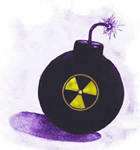Nuclear Chicken and the `Madman` Theory
 |
A few months ago, I predicted that there would be no U.S. military strikes on Iran. While the Bush administration would desperately love to, given the balance of forces it is almost certain to be a strategic disaster. This kind of argument is dangerous when dealing with an administration that is severely insulated from reality, but I made it.
Was I wrong? On April 2, the Daily Telegraph, favored mouthpiece for the British military, ran a story about British meetings and evaluations of U.S. plans to attack Iran; anonymous officials said that a strike on Iran was "inevitable" if it did not comply with demands to freeze uranium enrichment.
And then, in the April 17 issue of the New Yorker, Seymour Hersh, tapping his anonymous dissident sources inside the military-intelligence complex, writes that the Bush administration has:
Hersh says military analyst Sam Gardiner estimates that the United States would need to hit about 400 targets in order to disrupt Iran's putative nuclear weapons program. Some of those sites are so well-buried that it's possible they can only be destroyed with tactical nuclear weapons.
All in all, it sounds pretty scary. Hersh has shown time and again his ability to get stories that nobody else does.
And yet, that's not how I see it. In fact, I feel a profound sense of deja vu. We had exactly the same scare last year in early spring/late winter, complete with a Seymour Hersh article and predictions of imminent war by people like Scott Ritter. In fact, we also saw last year, as this year, both the U.S. government and the Iranian government dismissing the claims in Hersh's article.
The war didn't happen last year. And all that has changed since then is that Bush has recklessly spent down his political capital, at home and abroad. There is more cooperation with Europe, but Europe doesn't want military action.
Some would say that this is also an exact repeat of the lead-up to the Iraq war, complete with statements that Iran has a chance to resolve this diplomatically, or the U.S. will go to war. The difference, of course, is that the Iraq war was undertaken in an era of expansive military triumphalism, when nearly all informed opinion thought the Vietnam syndrome had been kicked forever; a mere three years later, we live in an era of stark pessimism about the ability of the United States to transform the world by violence.
So I think what we are seeing is what military analyst Fred Kaplan calls a game of "nuclear chicken." The United States and Iran are locking themselves into a collision course, each saying that it will not back down under any circumstances. The threat of military strikes against Iran shows not the likelihood of military action but the desperation of the United States, which seems to have exhausted all its cards and can only hope to scare the Iranians into negotiating.
The talk about using so-called "nuclear bunker-busters" goes a step further than that, resurrecting Nixon's old "madman" theory - the quaint idea that if he appeared crazy and violent enough, he could scare the Vietnamese into capitulating. Well, Nixon understood neither the Vietnamese nor the war he was fighting, and his madman theory went into the dustbin of history, only to be occasionally pulled out and dusted off by nuclear hawks (in the Clinton administration as well as this one).
Although, as I outlined before, the United States cannot gain strategically from going to war, if it so happens that it does, make note of this: The war will be justified on the basis of claims that the Iranian rulers are crazy and cannot be trusted to act rationally in their own interests (by refraining from attacking the United States or its allies). At the same time, the war will actually be predicated on a belief that the Iranian government is very sane. Given how amazingly well-placed Iran is to destabilize Iraq even further and to retaliate against soft targets around the world, the United States will be depending on deterring them from retaliation with further threats.
Rahul Mahajan teaches at New York University. He has been to Iraq twice and reported extensively from Fallujah during the siege in April.
Topics: Foreign Policy, Iran, Journalists, United States Of America
Views: 3790
Related Suggestions
Jewish terrorists and their proxys shouldnt act surprised that their behavior isnt welcome in the region.
This has to be the bravest man on the face of the
earth telling the truth about Isreal, this is somthing that should have been said 50 years ago.
Even though Isreal is fully backed by the
United States of America, I hope for the best
for this brave man and his people.
So I'm thinking maybe it has been a long time since religious beliefs have mattered as much in a similar contest of national will. In a sense, it is a game of chicken in which both drivers can win, so long as neither driver chickens out. Granted some of their passengers might think otherwise.
Plus the people of Iran seem to want nuclear energy (and/or deterrence) more than the people of Iraq seem to have wanted Saddam to continue doing the driving. Perhaps that is just the sort of thing US officials might care to consider. That and how the American people might feel about having been utilized to compel people not unlike themselves to enter a pool of fire.
And who knows? Perhaps the thought of being tried before the International Court could begin to seem less humorous to the wantonly preemptive. That is, whether or not they claim to care about protecting their position in this life.
Bush can learn some manners his parents didn't teach to him.

















